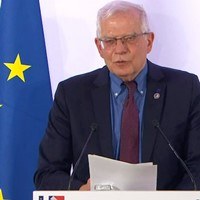(BRUSSELS) – The EU condemned Russia’s recognition Tuesday of the Donetsk and Luhansk oblasts of Ukraine as independent entities and their invasion by Russian troops, outlining a number of financial and trade sanctions.
In a statement, EU Council President Charles Michel and Commission chief Ursula von der Leyen condemned the “blatant violation of international law as well as of the Minsk agreements” with sanctions against “those involved in this illegal act”.
They reiterated the EU’s “unwavering support to Ukraine’s independence, sovereignty and territorial integrity within its internationally recognised borders”.
EU foreign policy chief Josep Borrell added: “This illegal act further undermines Ukraine’s sovereignty and independence and is a severe breach of international law and international agreements, including the UN Charter, Helsinki Final Act, Paris Charter and Budapest Memorandum.
“As a signatory of the Minsk agreements, Russia has a clear and direct responsibility to work to find a peaceful settlement of the conflict in line with these principles. With the decision to recognise the non-government controlled region of eastern Ukraine as “independent states”, Russia is clearly violating the Minsk agreements, which stipulate the full return of these areas to the control of the Ukrainian government.”
He warned Russia against using the newly signed pacts with the self-proclaimed ‘republics’ “as a pretext for taking further military steps against Ukraine. The EU warns Russia that the EU stands ready to swiftly adopt “wide-ranging political and economic sanctions”.
An informal meeting of EU Foreign Affairs Ministers reached unanimous agreement on a package of sanctions which target:
- The 351 members of the Russia State Duma who voted for what the EU terms a “violation of international law and territorial integrity and sovereignty of Ukraine”
- 27 individuals and entities, who are “playing a role in undermining or threatening Ukrainian territorial integrity, sovereignty and independence”. These persons and entities are in the following three areas: First, the decision-makers responsible for threatening Ukraine, entities supporting financially and materially, or benefiting from them, those in the defence sector for having played a role in the invasion and destabilisation actions and those who wage a disinformation war against Ukraine and banks that are financing Russian decision-makers and other operations in those territories.
- the EU is also targetting the economic relations between the two regions and the European Union, exactly as was done in the case of Crimea, “to ensure that those responsible clearly feel the economic consequences of their illegal and aggressive actions”.
- Finally, the EU is targetting the ability of the Russian state and government to access European capital and financial markets or services. This is limiting the financing of their policies through limiting the access of their sovereign debt to the EU’s financial markets.
The package complements today’s most important sanction today, by Germany, which strengthened the unity of the EU’s message by announcing that it would stop the qualification – and so the working of the Nord Stream 2 pipeline.
Mr Borrell added that the EU has prepared and stands ready to adopt additional measures at a later stage if needed in the light of further developments.
He also stressed that diplomatic efforts would continue “to avert a new eruption of war, of a conflict in the heart of Europe”.
Special informal meeting of EU foreign ministers on the situation in Ukraine



